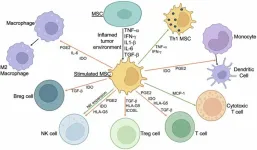Democracy fatigue: An intelligent system that combines direct and representative politics helps to counter this
2024-12-03
(Press-News.org)
Democracy is in crisis. Many people are losing confidence in political parties and parliaments and their ability to solve pressing social problems in the long term. Recent studies by the University of Stuttgart indicate that addressing doubts about the democratic system does not necessarily require resorting to the election of an autocratic head of state. Rather, more direct political participation could revitalize and legitimize democracy - provided that innovative participatory formats are intelligently linked to the work of representative institutions.
“Many people consider representative politics to be tiring and dysfunctional in the face of existential crises,” says Prof. André Bächtiger, Head of the Department of Political Theory and Empirical Democracy Research at the University of Stuttgart's Institute for Social Sciences. “Some voters are therefore relying on a strong head of state to bring order to a world that has gone off the rails.” Bächtiger and his team are researching democratic alternatives that could counteract the misery. In a recent study published in the prestigious journal American Political Science Review, he, along with Saskia Goldberg from KU Leuven in Belgium and Marina Lindell from Åbo Akademi University in Finland, explored the concept of "Lottocracy" and its potential for implementation.
Political Participation by Lottery: A Practice from Ancient Athens
Similar to ancient Athenian democracy, a "lottery democracy" uses random selection to determine who may participate directly in political decisions, by serving on a citizens' council for example. "They operate competently, free from party or lobby influences, and ideally represent the interests of the entire citizenry," explains Bächtiger. According to the expert, such “mini-publics” work surprisingly well in practice. Participating citizens not only engage in discussions at an impressively high level but also often achieve consensus on contentious issues. Political scientists, sociologists and philosophers discuss what powers such councils should actually have in political practice. Should citizens take their fate into their own hands? Should they be allowed to make binding decisions or even completely replace dysfunctional parliaments? Or is it illegitimate for a small group of randomly selected citizens to make decisions on behalf of others without direct accountability or effective representation?
Lottocracies: How do members of the public view these?
Bächtiger, Goldberg and Lindell wanted to know how members of the public, as the addressees of such reform efforts, view lottocratic citizens' councils. The study revealed that while respondents generally found this form of direct democracy intriguing, they were more hesitant when it came to granting it decision-making powers. The researchers observed this pattern in very different country contexts - in the politically highly polarized USA; in Ireland, where people already have a lot of experience with citizens' councils; and in Finland, where there is a high level of political and social trust. However, only 15 to 25 percent of respondents had even heard of citizens' councils before and only around four percent had ever been involved in one. The study also shows that citizens who already have experience with direct democracy formats in particular are more open to mini-publics with decision-making power. However, uncertainty remains when it comes to the question of whether citizens' councils should have "decision-making power or merely an advisory role”.
Future democracies: Complex models of citizen participation
“This raises new questions for the design of future democracies,” says Bächtiger. In a current research project by the Bertelsmann Foundation, he and his team asked participants in the citizens' council "Forum against Fakes" to share their views on what they believe an ideal democratic system should look like. Here, too, the participants would like citizens' councils to play a more important role in decision-making. However, they would like them to be linked to the existing representative institutions. “They want to use the best of both worlds,” says Bächtiger. Representative institutions promote the articulation of problems and politicize people. Lottocratic institutions, in turn, improve the quality of political discourse, create trust and encourage people to be impartial and consider the interests of society as a whole.
Multi-chamber systems: Smarter decisions and more satisfaction
There are already approaches that combine decision-making mini-publics with existing democratic institutions at the municipal level, such as in East Belgium and Paris. There, lottocratic chambers are linked to the representative system. “The future of democracy therefore does not lie in replacing existing representative systems, but in intelligently combining representative and lottocratic institutions,” concludes Bächtiger. "This might not only lead to more informed decisions but also significantly boost the public’s satisfaction with democracy."
About the study
The study “Empowered Minipublics for Democratic Renewal? Evidence from three conjoint experiments conducted in the United States, Ireland, and Finland” was published in the American Political Science Review and is available via Open Access. It is based on so-called conjoint experiments, a method that originates from the marketing sector, where it is used to evaluate products and their design. As part of the study, approximately 6,000 representative individuals aged 18 and over evaluated citizens' councils as a hypothetical model for the future of democracy. The study was conducted in 2021 and 2022 in the USA, Finland and Ireland, three comparable countries with an established liberal democracy.
END
[Attachments] See images for this press release:

ELSE PRESS RELEASES FROM THIS DATE:
2024-12-03
Toronto, ON – Transgender and gender-diverse preteens are about 15% less physically active than their cisgender peers, new research finds.
Transgender 11-12 year-olds take, on average, 1,394 fewer steps per day compared to cisgender adolescents, a difference that equates to about 12% of the daily physical activity recommended for adolescents. The study was published in Annals of Epidemiology.
“Transgender adolescents may experience stigma and discrimination that discourage their participation in team sports or physical activity,” ...
2024-12-03
In late 2022, OpenAI released ChatGPT, an artificial intelligence (AI) chatbot able to generate conversational answers and analyses, as well as images, in response to user questions and prompts. This generative AI was built with computational procedures, such as large language models, that train on vast bodies of human-created and curated data, including scientific literature. Since then, the worry that AI may someday outsmart humans has grown more widespread.
In a new collection of essays, leading ...
2024-12-03
Physicists are getting closer to controlling single-molecule chemical reactions – could this shape the future of pharmaceutical research?Controlling matter at the atomic level has taken a major step forward, thanks to groundbreaking nanotechnology research by an international team of scientists led by physicists at the University of Bath.
This advancement has profound implications for fundamental scientific understanding. It is also likely to have important practical applications, such as transforming the way researchers develop new medications.
Controlling single-outcome single-molecule reactions ...
2024-12-03
“MSCs hold great promise as a therapeutic tool in cancer immunotherapy due to their immunomodulatory properties, tumor-homing abilities, and potential as carriers for delivering therapeutic agents.”
BUFFALO, NY – December 3, 2024 – A new review was published in Oncotarget’s Volume 15 on November 22, 2024, entitled “Mesenchymal stem cells – the secret agents of cancer immunotherapy: Promises, challenges, and surprising twists.”
Authored by Theia Minev, Shani Balbuena, Jaya Mini Gill, ...
2024-12-03
About The Study: In this cohort study of 1,600 emergency medicine patient medical records, large language model (LLM)-generated emergency medicine-to-inpatient handoff notes were determined superior compared with physician-written summaries via conventional automated evaluation methods, but marginally inferior in usefulness and safety via a novel evaluation framework. This study suggests the importance of a physician-in-loop implementation design for this model and demonstrates an effective strategy to measure pre-implementation patient safety of LLM models.
Corresponding ...
2024-12-03
Patients with frontotemporal dementia often lack the ability to empathize. A study at Karolinska Institutet has now shown that these patients do not show the same brain activity as healthy individuals when they witness the pain of others, a finding that it is hoped will increase understanding of this specific dementia disease.
Around 25 000 Swedes are affected by dementia every year. Of these, about three percent are diagnosed with frontotemporal dementia. The disease is difficult to diagnose, but one of its characteristics is that sufferers lose the ability to empathize, which can lead to problems for them, and not least ...
2024-12-03
CAMBRIDGE, MA -- Gastric balloons — silicone balloons filled with air or saline and placed in the stomach — can help people lose weight by making them feel too full to overeat. However, this effect eventually can wear off as the stomach becomes used to the sensation of fullness.
To overcome that limitation, MIT engineers have designed a new type of gastric balloon that can be inflated and deflated as needed. In an animal study, they showed that inflating the balloon before a meal caused the animals to reduce their food intake by 60 percent.
This type of intervention ...
2024-12-03
WASHINGTON, D.C. — The Patient-Centered Outcomes Research Institute (PCORI) has approved funding awards totaling more than $156 million for new patient-centered comparative clinical effectiveness research (CER), as well as research to improve methods and strengthen the science of engagement in CER. The awards will support 13 CER studies, including three focused on sleep interventions.
“Poor sleep affects more than 50 million people in the United States and is linked to multiple chronic conditions and negative health outcomes,” said PCORI Executive Director Nakela L. Cook, M.D., MPH. “These ...
2024-12-03
ATLANTA — Debra Bangasser, a professor of neuroscience and director of the Center for Behavioral Neuroscience (CBN) at Georgia State University, has been awarded the Daniel H. Efron Research Award by the American College of Neuropsychopharmacology (ACNP).
The award recognizes outstanding basic research contributions to the field of neuropsychopharmacology, which integrates neuroscience and pharmacology to advance understanding of the causes of psychiatric disorders and develop new therapies. Bangasser’s research identifies how stress throughout the lifespan affects the brain to promote ...
2024-12-03
SEATTLE, WASH.—December 3, 2024—The funding, provided through the Allen Distinguished Investigators, a program of The Paul G. Allen Frontiers Group at the Allen Institute, will fuel innovative research in Organelle Communication and Membrane Biophysics. Together these awards represent a total of $9 million dollars in funding from the Paul G. Allen Family Foundation, which will be distributed between 14 researchers investigating the biological principles governing fundamental cellular functions and how they interact. These ...
LAST 30 PRESS RELEASES:
[Press-News.org] Democracy fatigue: An intelligent system that combines direct and representative politics helps to counter this






